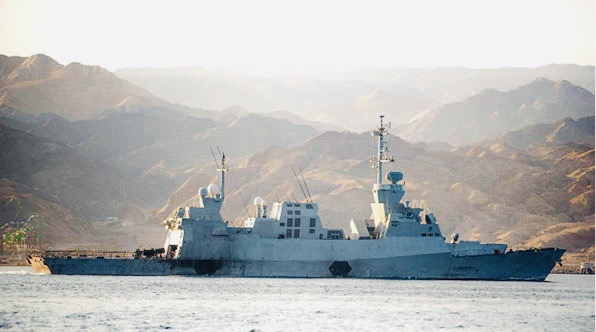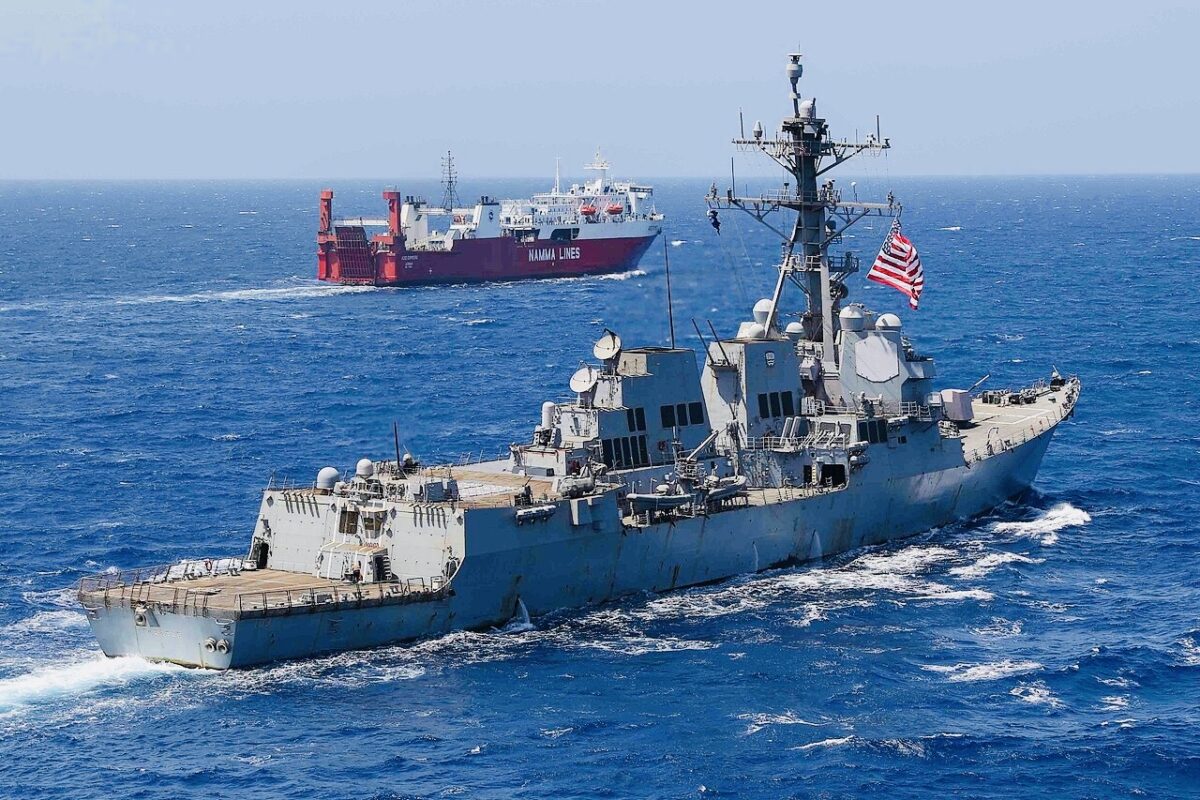On December 18, the United States belatedly announced the formation of a coalition of nations to curb Houthi attacks on cargo ships and oil tankers plying the waters of the Red Sea, through which 12 percent of global trade passes.
It was a long overdue move.
Houthi pirates in Yemen, backed by Iran, have been wreaking havoc on the international economy, which is reliant on the ability of merchant ships to navigate waterways and oceans without hindrance or interference. By one estimate, 90 percent of the world’s commerce is expedited by way of the sea.
Yesterday’s announcement was delivered by U.S. Secretary of Defence Lloyd Austin in Bahrain. In a bold statement, he said that Houthi aggression “demands collective action.”

The U.S. ambassador to the United Nations, Linda Thomas-Greenfield, warned that the Houthis threaten “navigational rights and freedoms, international maritime security and international commerce.”
Austin’s announcement came on the heels of two major developments.
On December 17, U.S. and British vessels downed 15 Houthi drones over the Red Sea, which the Houthis have been trying to block to Israeli maritime traffic since the outbreak of the Israel-Hamas war in the Gaza Strip on October 7.
In the days leading up to these events, five major shipping and oil companies — BP, MSC, Maersk, CMA CGM Group and Hapag-Lloyd — rerouted their vessels from the Red Sea to the Cape of Good Hope in what was described as a “precautionary pause.”
This will surely cause delays and price increases, which are bound to exacerbate inflationary pressures, the bane of consumers since the eruption of the Covid-19 pandemic. By one estimate, the price of Brent crude, the conventional oil benchmark, has risen by some eight percent in the past week.
The coalition, officially known as Operation Prosperity Guardian, will consist of nine countries apart from the United States — Canada, Britain, France, Italy, Holland, Norway, Spain, Bahrain and Seychelles — and several nations that prefer to remain anonymous.
They will conduct joint patrols and provide intelligence support in the southern Red Sea, the Bab-al-Mandeb Strait, and the Gulf of Aden.

The Bab-al-Mandeb Strait, in particular, is a critical component of maritime commerce, a chokepoint between the Red Sea and the Gulf of Aden that affects the security of the Suez Canal. Last year, 23,000 ships transited the canal, accounting for almost 12 percent of global maritime trade.
The strait is also the only access point from the Indian Ocean to the Israeli, Jordanian and Saudi Arabian ports of Eilat, Aqaba and Jeddah. Houthi attacks have made the area too dangerous for shipping and have potentially imperilled the canal as well.
The Houthis began launching attacks in the Red Sea in response to Israel’s air campaign in Gaza following Hamas’ slaughter of 1,200 Israelis and foreigners in southern Israel on October 7. Houthi spokesman said that ships flying Israeli flags or operated or owned by Israeli companies would be targeted.
Their attacks are motivated by anger over the “genocidal war” Israel has waged in Gaza. Prior to October 7, the Houthis focused their attention on Yemen and its neighbors.
Inflammatory Houthi slogans run the gamut from “Death to America” and “Death to Israel” to “Curse the Jews” and “Victory to Islam.”
Since October, the Houthis have fired long-range drones and missiles at Eilat, all of which have been intercepted by the U.S. and Israel. Nevertheless, Israel has beefed up its naval patrols in the Gulf of Aqaba, which leads into the Red Sea.

Last month, the Houthis hijacked the M/V Galaxy Leader and its crew of 25 sailors, which they still hold. The ship is partially owned by an Israeli businessman, but no Israeli citizens were on board when it was captured.
On December 3, three other commercial ships were attacked in the Red Sea, near the Bab-al-Mandeb Strait. In their latest act of piracy two days ago, the Houthis targeted the Swan Atlantic and the MSC Clara.
All told, the Houthis have launched ten attacks on ships in the area in the last two-and-a-half months.
The United States, having condemned them as “a direct threat to international commerce and maritime security,” has positioned 19 ships, including two aircraft carrier groups, in the region.
Twelve of them are in the Red Sea, the Arabian Sea and the Persian Gulf. The remainder are in the eastern Mediterranean Sea, off the coast of Israel.
With the Gaza war still raging and expected to last for months, the United States is reluctant to open a new front by striking the Houthis or its sponsor and protector, Iran. But with the Houthis vowing to keep up attacks, the U.S. and its allies may have no alternative but to escalate the conflict and bombard Houthi bases in Yemen.
If necessary, Iran, the instigator, should be targeted too.
The Houthis must understand that their unbridled aggression represents a clear and present threat to international commerce and should not be tolerated any longer.
